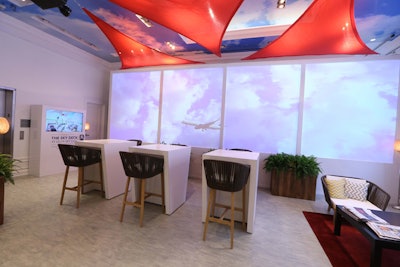In the past year, Delta Air Lines has staged major activations related to the new John F. Kennedy International Airport’s Terminal 4, as well as at the TED Conference, both in partnership with experiential agency MKG. Far from being one-offs, the innovative experiential programs have been a core part of the brand’s marketing mix for years.
“Many of Delta’s biggest markets are the most crowded and noisy from a marketing and messaging standpoint,” says Delta’s director of sponsorships and brand activation, Annika Schmitz. “We have to create experiences to help our brand stand out in consumers’ minds, and then encourage them to have a conversation about it in their own social channels.”
A compelling example of one such experience was the program the airline created for TED in Vancouver, British Columbia. There, Delta launched its new Innovation Class—a partnership with LinkedIn to give up-and-coming business people the opportunity to sit next to industry leaders on flights—with a digital experience called “Social Soul.”
The exhibit was housed inside a structure covered with monitors and mirrors. Attendees tweeted with the hashtag #SocialSoul and then saw and heard content from their Twitter stream all around them. Next, the system transitioned into a display of the stream of another attendee, selected by a custom algorithm that identified matching keywords. The hashtag generated 8.3 million impressions.
“We demonstrated Delta’s leadership in areas our customers have told us they value—connectivity and technology,” Schmitz says. “These pieces tied back to our in-flight experience and ignited a conversation among an extremely influential audience.”
To raise awareness of the $1.4 billion investment Delta made in its new J.F.K. terminal, the brand recreated key elements of its airport experience in a public space in Manhattan. Delta’s monthlong experiential pop-up lounge, known as “T4X,” allowed consumers to interact with many of the new amenities, services, technology, dining options, and employees that would be available at the airport.
Experiential activations also play a large role in showcasing Delta’s key partnerships in the biggest markets around the world. The brand has made investments in some of the most high-profile sports franchises, entertainment properties, and cultural organizations, including the New York Yankees, the Los Angeles Lakers, and the Chelsea Football Club.
“The challenge is breaking through the multiple messages targeted to fans and consumers,” Schmitz says. “So, the most effective way for Delta to differentiate is to bring our brand to life at these events. A key component is activations that showcase our product attributes in an innovative and distinctive way, and allow consumers to engage and truly interact.”
And it’s working: Delta was named the 2014 Airline of the Year by Air Transport World magazine, the first time a United States airline took the honor in a decade. In February, the airline announced it would pay its employees more than half a billion dollars in earned profit sharing—the highest payout in company history. That’s after it reported $2.7 billion in net income for 2013, an increase of $1.1 billion over 2012.





















